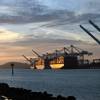Frank J. Iarossi, Chairman and Chief Executive Officer of ABS has sharply rebutted the widespread impression that the safety record
of the international shipping industry is poor and that even greater
regulation is required to address this.
"Whether we are measuring marine safety in terms of vessels lost at sea, or
maritime fatalities or oil spilled from ships; whether we are using data
from governmental agencies, the insurance industry or the shipping
industry; whether we are considering the past 30 years or the past 10 years
? all the trends clearly indicate the maritime industry continues to show
dramatic improvement in its safety and environmental performance," Iarossi
said when delivering the 17th Annual Chua Chor Tek Memorial Lecture in
Singapore.
Iarossi lamented the strongly negative image of the industry within the public arena. "The public perception of the marine industry continues to be
shaped not by the contribution made to international prosperity, but by the
very infrequent, and sometimes very tragic casualty," he said.
The ABS chairman provided a welter of statistics drawn from sources as disparate as the United Nations, the International Tanker Owners Pollution
Federation, the US Coast Guard and the International Union of Marine Underwriters Joint Hull Committee among others in support of his contention that the marine industry's safety record was the equivalent to or better
than most industries in particular other transportation modes, including
commercial aircraft.
"The commercial aircraft loss rate per million flight or voyage hours at
risk is three times that for merchant ships," he said. "But has anyone
heard any uproar over airline safety? Since 1988 the merchant vessel loss
rate per 1000 units has been consistently lower than the commercial
aircraft rate. Has the United Nations or the European Union or the US
Congress rushed into emergency session to mandate a double set of wings on
all aircraft?"
Actual loss rates for vessels of all types of 100 gross tons or more have been halved in the past ten years to about two vessels per thousand per year. In the last ten years, total losses of all vessels over 500 gross tons has declined from more than 180 vessels to less than 80 per year, he
stressed. In tonnage terms this represents a decline from 1.75 million gross tons to less than 750,000 gross tons or 0.1 percent of the world
fleet.
Iarossi also noted that in the past ten years marine fatalities have declined dramatically from over 500 per year to less than 200, while oil
spilled from ships has declined by over 70 percent.
Addressing the particular role of class within the maritime safety chain, Iarossi noted that "while class seems to get the brunt of the blame in the trade press for vessel losses, data from the Joint Hull Committee shows that only a small percentage of losses has been attributed to hull or structural causes."
"This industry revolves around the largest mobile structures ever designed
and built, moving all manner of cargoes to all corners of the world in an
often unforgiving marine environment," he reminded the audience of shipping
industry notables. "Marine transportation is definitely not risk free. It
is not possible to mandate an error free operating environment or an
unsinkable ship. There will always be a degree of risk associated with
navigating the uncertain and often turbulent waters of the world's oceans."
What should be paramount, Iarossi emphasized, is that the marine industry
demonstrate its dedication to safety and environmental concern through
continuously striving to improve its performance. "I believe the record is
clear," he stated. "The marine industry has made, and continues to make
dramatic improvements in both safety and pollution prevention."
Iarossi laid some of the blame for the negative perception of the industry
on the industry's own trade press. The continuous attention that is paid to
the very small substandard minority within the trade press "influences the
general media," he claimed, "which in turn communicates to the wider public
an image of a ruthless, reckless and irresponsible industry." This in turn
reinforces the perception within governments that the marine industry
"cannot be trusted to improve its safety performance without government
mandated action."
The reality, Iarossi argued, is that the marine industry has "significant reason to be very proud of its safety achievements." He suggested that, if
the industry is to improve that negative public image "an organization will have to step up, or will have to be created with the express role of
monitoring industry safety and environmental performance, collecting industry data, defining positive and negative trends, exchanging that data
with other organizations and governments, publicizing those trends so as to provide reality to the formation of perceptions and stimulate corrective action when required by the industry in order to meet realistic expectations of society."
Featured videos

Inside the Electrified Truckable Tug

Inmarsat Enhances Service to Drive Digitalization

Tracking Foreign Vessels Working in the U.S. Jones Act Market
Subscribe for
Maritime Reporter E-News
Maritime Reporter E-News is the maritime industry's largest circulation and most authoritative ENews Service, delivered to your Email five times per week









